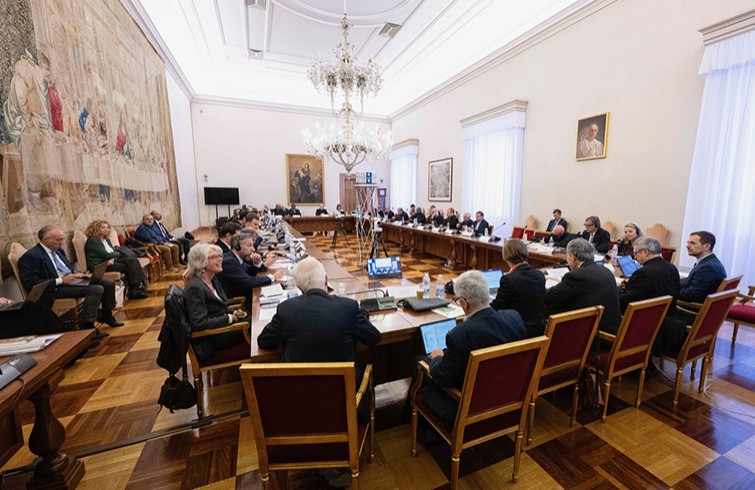The Plenary Assembly of the Dicastery for Communication took place in the Vatican from October 28 to October 30. It gathered Members and the Consultors of the Dicastery, under the title “For a constitutively synodal communication”. In line with this theme, the discussions and presentations centered on listening, participation, sharing, and fostering communion.
The second day of the Plenary Assembly featured a number of guests; practitioners and witnesses to virtuous models of communication. They shared their stories with Members and Consultors of the Dicastery, offering inspiration for exploring new ways to contribute to the field of communication and the contemporary media landscape.
Solutions journalism and participatory storytelling
Peter Rachada Monthienvichienchai, executive director of LiCAS.news (Light of Catholics in Asia, Light for the Voiceless) and the secretary general of SIGNIS (the World Catholic Association for Communication) presented the work of LiCAS.news. Their mission is to tell the stories of those on the fringe of society with empathy and respect, to shine the spotlight in the darkness of the disadvantaged and neglected, and to give voice to the voiceless. LiCAS.news covers the stories about social issues in Asia based on Catholic Solutions Journalism. Monthienvichienchai emphasized that, in addition to addressing critical situations and proposing possible solutions, they also provide a perspective on the efforts already made to tackle the issue at hand. They listen to the challenges and stories of those who have overcome these problems, give a voice to the voiceless in society, and foster hope.
Empowering the voiceless is also the mission of the London-based media On Our Radar, a specialist group of journalists, filmmakers, digital storytellers and community practitioners. Co- director Chris Walter shared their success in participatory storytelling, co-production and community journalism, carried out by training and coaching people on the margins of society to empower them to tell their stories themselves, in their own words and time, revealing the realities of unheard communities worldwide. Walter emphasized that the communities are experts in their own experience and that the most powerful stories come straight from the source.
Application for connecting the faithfull in India
Guests from India, coordinated by Fr. Stephen Alathara, deputy secretary general of the Conference of Catholic Bishops of India (CCBI), and Fr. Cyril Joseph, media director of the Archdiocese of Bangalore, have presented the application Catholic Connect, inaugurated in the beginning of 2024 by the Catholic Bishops Conference in India (CCBI). The Catholic Connect App is a mobile application for Catholics in India to stay better connected with the Church in multiple ways. In the presentation the creators highlighted the importance of networking in the Catholic world, connecting dioceses and parishes with the faithful, offering inspirational content and guidance, but also practical information for local communities and useful services, showcasing an example of how digital communication can virtuously serve local communities.
Media and information literacy
On October 30, two special guests prompted the Assembly's reflection with their speeches.
Divina Frau-Meigs, professor emerita of media sociology at Sorbonne Nouvelle University in France, and worldly renowned researcher in the media uses and practices, addressed the participants with a speech titled “Media and Information Literacy in the age of Artificial Intelligence”. Her speech prompted a reflection on the transformative impact of generative AI on the media and information landscape and highlighted the critical importance of media and information literacy in an era of rapidly evolving AI.
Through her “Butterfly” model, professor Frau- Meigs has illustrated 4 domains of digital literacy comparing them to 4 wings of a butterfly, without which a butterfly cannot fly. These are: values (defending freedom of expression, privacy, etc.), skills (in knowing how to use new tools), attitudes (in interpreting data and recognizing misleading content), and knowledge (knowing the geopolitics of AI, in being aware of information disorders).
It is along these lines, Professor Frau-Meigs said, that the role of the Dicastery as guarantor and promoter of ethical and conscious communication could emerge in the future.
The power of generosity
The final speech was delivered by Chris Anderson, a journalist and curator of TED, a nonprofit media organization that leverages the power of ideas to make a better future.
Anderson shared his important experience from 2006, when he decided to publish selected TED talks on the internet. These videos quickly went viral, revealing to him the impact of generosity and virality put at the service of “good” ideas. Since then, Anderson has developed a virtuous framework, “ideas worth spreading.” In his recently published book, “Infectious Generosity”, Anderson writes about the power of “letting go” and the importance of not fearing to share, as generosity, when it goes viral, has the potential to reach millions.
Concluding his speech, Anderson encouraged participants not to be afraid to share stories of generosity, good deeds, and compassion. Such stories, he noted, can spread like viruses, they can “infect” people, inspire other good ideas, and finally trigger positive forms of influence.






